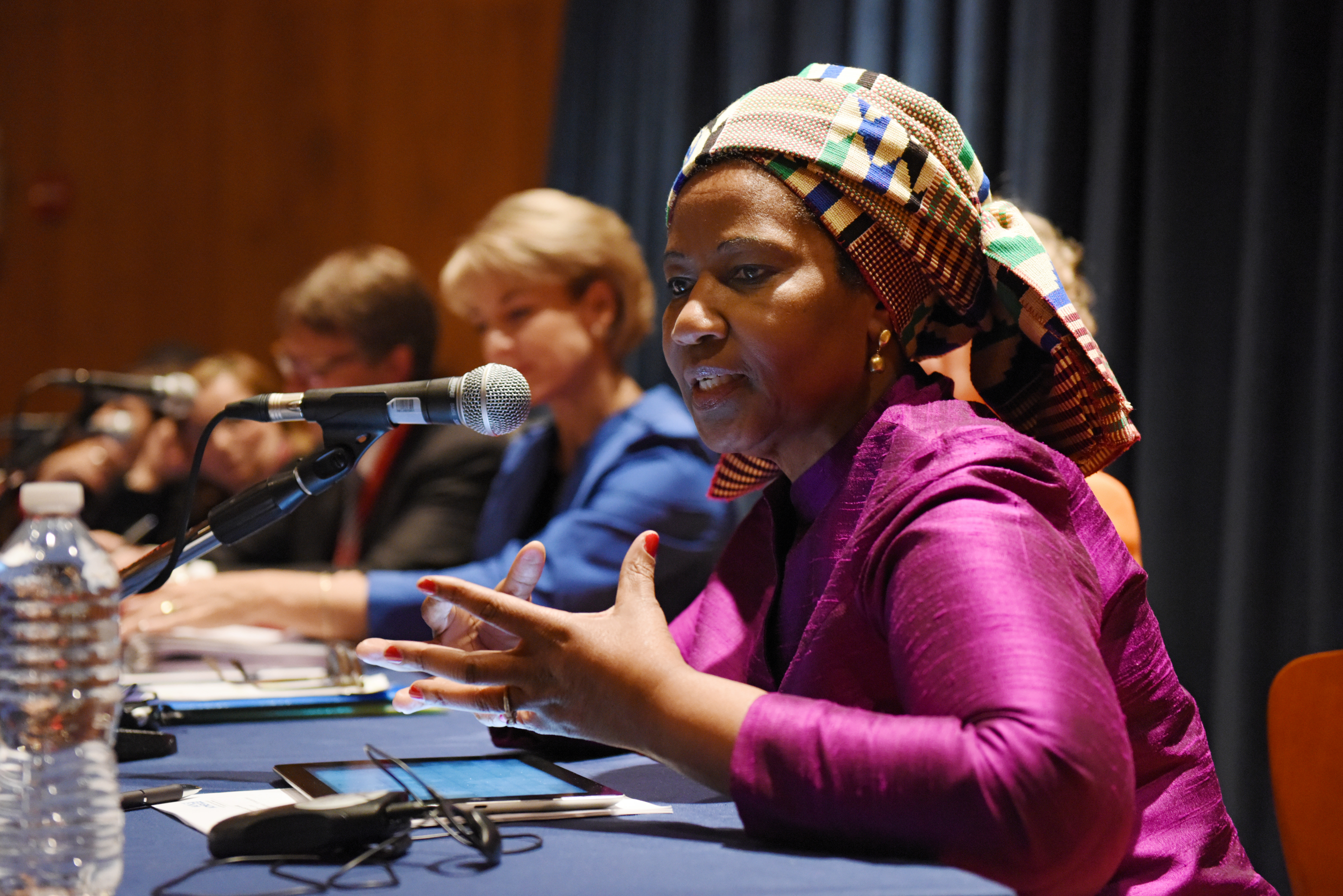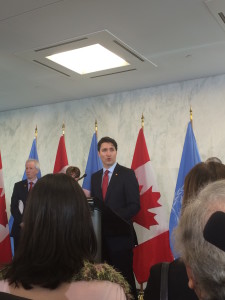IRSAM at the 60th Commission on the Status of Women
 UN Women Executive Director Phumzile Mlambo-Ngcuka speaks at the high-level panel: “Women in Political Leadership - Achieving equality in political decision-making” co-hosted by the Permanent Missions of Algeria, Australia, Chile and Switzerland to the United Nations. The panel was held as a side event during the 59th Session of the Commission on the Status of Women.
The panel consists of: Mounia Meslem Si Amer, Minister of National Solidarity, Family and the Status of Women, Algeria; Senator Michaelia Cash, Minister Assisting the Prime Minister for Women,Australia; Claudia Pascual, Minister-Director of the
National Women’s Service, Chile; Corine Mauch, Mayor of the City of Zurich, Switzerland; Phumzile Mlambo-Ngcuka, Executive Director, UN Women; Martin Chungong, Secretary General of the Inter-Parliamentary Union
Moderator:Benno Bättig, Ambassador, Secretary General of the Federal Department of Foreign Affairs, Switzerland
Photo: UN Women/Susan Markisz
UN Women Executive Director Phumzile Mlambo-Ngcuka speaks at the high-level panel: “Women in Political Leadership - Achieving equality in political decision-making” co-hosted by the Permanent Missions of Algeria, Australia, Chile and Switzerland to the United Nations. The panel was held as a side event during the 59th Session of the Commission on the Status of Women.
The panel consists of: Mounia Meslem Si Amer, Minister of National Solidarity, Family and the Status of Women, Algeria; Senator Michaelia Cash, Minister Assisting the Prime Minister for Women,Australia; Claudia Pascual, Minister-Director of the
National Women’s Service, Chile; Corine Mauch, Mayor of the City of Zurich, Switzerland; Phumzile Mlambo-Ngcuka, Executive Director, UN Women; Martin Chungong, Secretary General of the Inter-Parliamentary Union
Moderator:Benno Bättig, Ambassador, Secretary General of the Federal Department of Foreign Affairs, Switzerland
Photo: UN Women/Susan Markisz
The annual United Nations Commission on the Status of Women (CSW) brings together members of civil society, governments and UN agencies to discuss pertinent issues impacting women and girls. The International Relations Student Association of McGill (IRSAM) holds consultative status with the United Nations Economic and Social Council (ECOSOC). While IRSAM has been attending CSW for the past 10 years, this was the first time a delegation was sent to both CSW and the Commission for Social Development (CSocD). You can read IRSAM’s statement on CSW60 here.
The priority theme for the 60th Session of the CSW (CSW60) was: women’s empowerment and its link to sustainable development. This theme is no surprise given the newly adopted Sustainable Development Goals (SDGs) and the “Planet 50/50” theme UN Women released for International Women’s Day 2016. While the 5th SDG is “Gender Equality,” the other goals have targets highlighting the importance of providing equal opportunity for men and women. For instance, target 8.5 of goal 8 is “by 2030, achieve full and productive employment and decent work for all women and men, including for young people and persons with disabilities, and equal pay for work of equal value.” Target 11.7 of goal 11 is, “by 2030, provide universal access to safe, inclusive and accessible, green and public spaces, in particular for women and children, older persons and persons with disabilities.”

Prime Minister Justin Trudeau made a visit to the United Nations while IRSAM was there. The Prime Minister announced Canada’s bid for a seat on the Security Council and participated in a dialogue on the empowerment of women with the Executive Director of UN Women, Phumzile Mlambo-Ngcuka. PM Trudeau made headlines for appointing a gender-balanced cabinet and referring to himself as a feminist. Trudeau addressed the attention he received for using the term feminist during his discussion with Mlambo-Ngcuka as he expressed, “why [is it that] every time I say I’m a feminist the ‘twitterverse’ explodes and news ad media pick it up- it shouldn’t be something that creates a reaction. It simply is saying I believe in the equality of men and women, and I believe we still have an awful lot of work to do to get there.”
In addition to this dialogue on women and economic empowerment, a variety of other gendered issues were addressed at the numerous side-events taking place during the Commission. Gender and humanitarian action was one of the many issues discussed by civil society, governments and UN agencies. One of the most powerful event I attended was co-hosted by the United Nations Office for the Coordination of Humanitarian Affairs (OCHA) and ActionAid International entitled, “Women as First Responders: Featuring Testimonies and a Visual Gallery Elevating Women’s Voices in Humanitarian Action.” The event brought together women who mobilized their communities in response to humanitarian crises ranging from the Ebola crisis in Liberia to Typhoon Haiyan among others. The powerful testimony of the panelists illustrated the important contributions women make when they are empowered and included. While listening to the testimony of women representing NGOs based in the field enabled me to understand the complex challenges complicating female empowerment, their resilience and determination left me hopeful.
The 60th session of the Commission concluded on March 24. The Commission emphasized gender equality was necessary for the realization of the SDGs, and outlined a list of agreed conclusions to tackle inequality. Phumzile Mlambo-Ngcuka emphasized, “Countries gave gender inequality an expiry date: 2030. Now it is time to get to work. These agreed conclusions entrench and start the implementation of a gender-responsive agenda 2030 with which we have the best possibility to leave no one behind.” The notion of “leaving no one behind” was prevalent throughout the Commission, whether it was at a side event discussing gender and humanitarian response or female empowerment within the United Nations itself.
